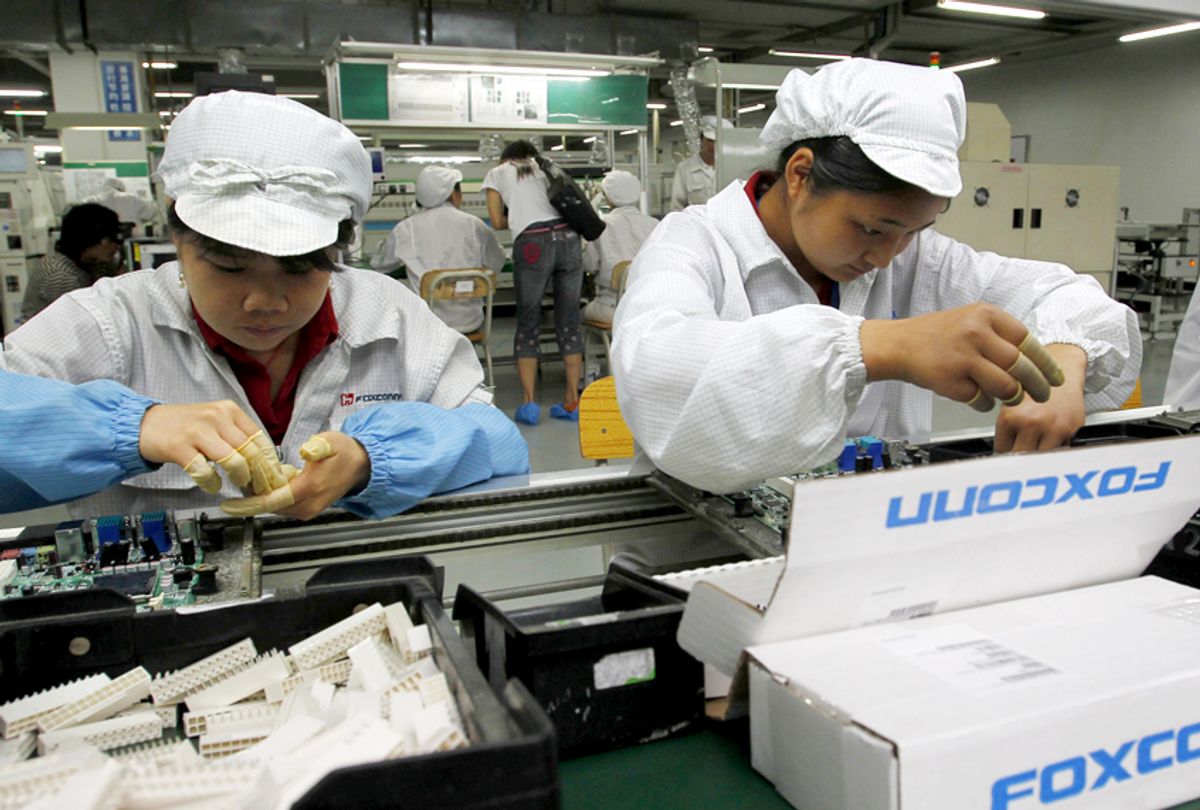Donald Trump traveled to Wisconsin today for a groundbreaking ceremony at a manufacturing plant for Foxconn, one of the largest electronics manufacturers in the world and a company that became infamous for labor abuses and worker suicides in its Chinese factories.
"As Foxconn has discovered there is no better place to build, hire, and grow than right here in the United States," Trump said during his remarks.
Foxconn chairman Terry Gou reportedly chimed in with claims that the plant will turn Wisconsin into a big tech player in the United States.
"Silicon Valley watch out,” Gou said. “Wisconsin Valley is coming."
House Speaker Paul Ryan also attended and spoke at the event, echoing what Trump has often said: that building Foxconn in Wisconsin will bring economic prosperity to the state.
"Jobs are being created in America, wages are going up, and Wisconsin is leading this story," Ryan said. "This story right here of Foxconn— it's the most vivid picture of what a strong and healthy economy looks like."
The Taiwanese electronics manufacturer best known for being contracted to produce iPhones recently found itself in the middle of a public debate during negotiations over the deal to bring one of their manufacturing plants to Wisconsin. Yet in touting the construction of Foxconn's Wisconsin manufacturing plant, Foxconn's biggest boosters — mostly pro-business conservatives like Trump and Ryan — have consistently failed to mention a grimmer part of the company's history.
Indeed, Foxconn is notorious for overworking its employees in its Chinese factories, often forcing them to work long days in harsh work conditions — to the point where some committed suicide. According to various reports, factory workers were reported to be clocking in 12 hours a day, six days a week. In 2010, self-inflicted deaths became such a widespread problem that the workers were reportedly being asked to sign “pledges” promising not to harm themselves, and the factory installed suicide nets.
Journalist Brian Merchant penned a book about Foxconn after he gained access to Longhua, one of its facilities, in 2010. In his book, excerpted by the Guardian, Merchant spoke to a young man who used to work at the facility for about a year.
“It’s not a good place for human beings,” the young man, known only as Xu, said. “There is no improvement since the media coverage.”
“It wouldn’t be Foxconn without people dying,” Xu added. “Every year people kill themselves. They take it as a normal thing.”
Xu’s friend told Merchant that perfection is valued, and public humiliation is no stranger to workers there.
“When the boss comes down to inspect the work,” Xu’s friend said, “if they find any problems, they won’t scold you then. They will scold you in front of everyone in a meeting later.”
“It’s insulting and humiliating to people all the time,” he added.
Foxconn went into PR damage control after the reports in the 2010s and late 2000s. Supposedly, Foxconn is now a marginally better place to work. After all the bad publicity, Apple, one of Foxconn's biggest clients, reportedly agreed to split costs to improve the factory conditions.
“We’ve discovered that this (improving factory conditions) is not a cost. It is a competitive strength,” Gou told reporters at a ground-breaking ceremony for a new Shanghai headquarters in 2012. “I believe Apple sees this as a competitive strength along with us, and so we will split the initial costs.”
Besides a history of labor abuses that might give one pause, luring Foxconn to build a factory in the United States was expensive for taxpayers — reportedly, the most costly deal for Wisconsin of 2017. According to an analysis by the Milwaukee Journal Sentinel, more than $200,000 in state taxpayer money will be spent per job.
Wisconsin gubernatorial candidate Kelda Roys, a strong opponent of the Foxconn deal, spoke out against the groundbreaking ceremony today.
“At a time when Wisconsin small businesses and family farms are struggling, throwing $4.5 billion at a bad bet is the last thing our state needs,” she tweeted. “Wisconsinites deserve better from our governor."



Shares